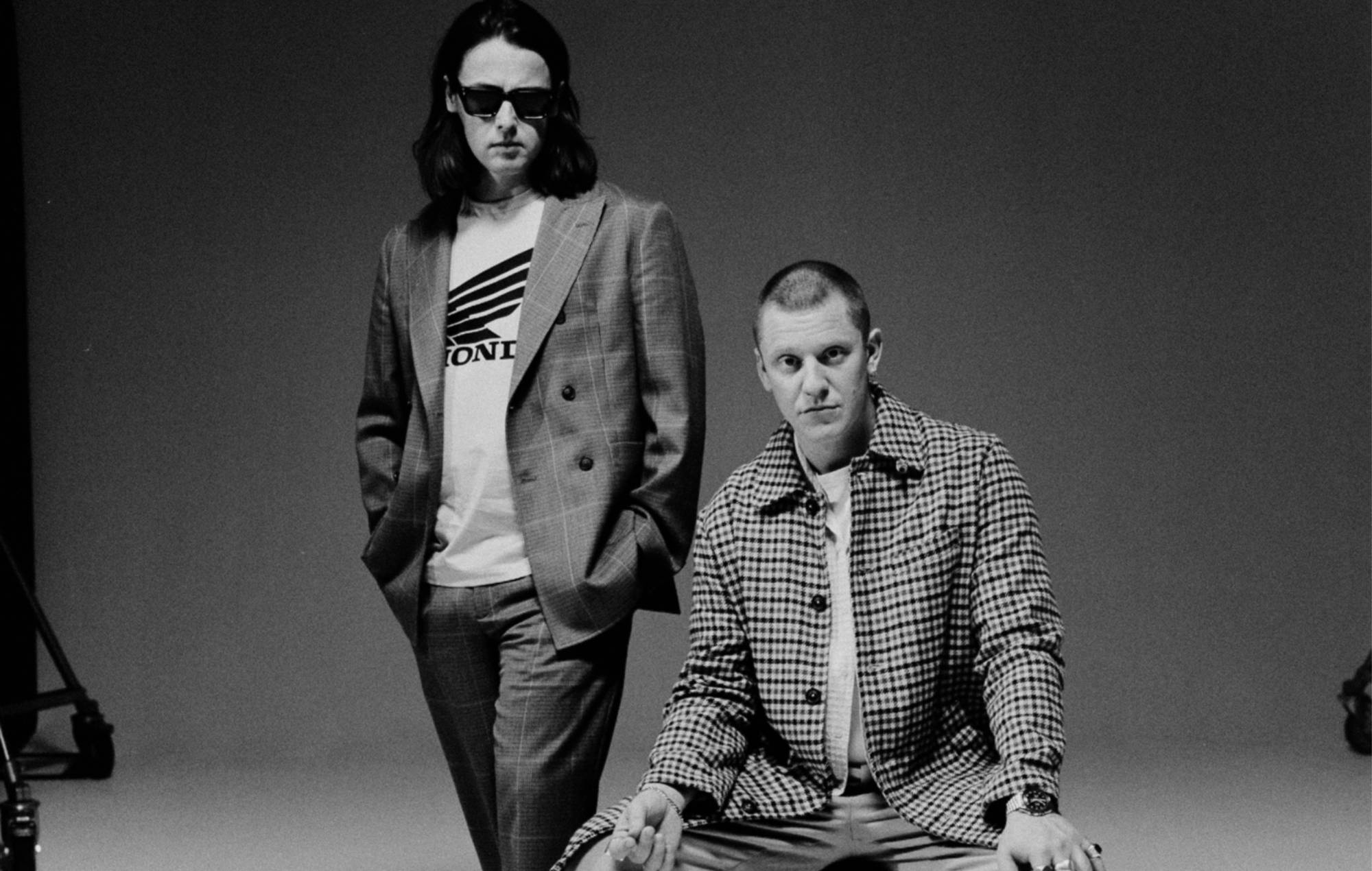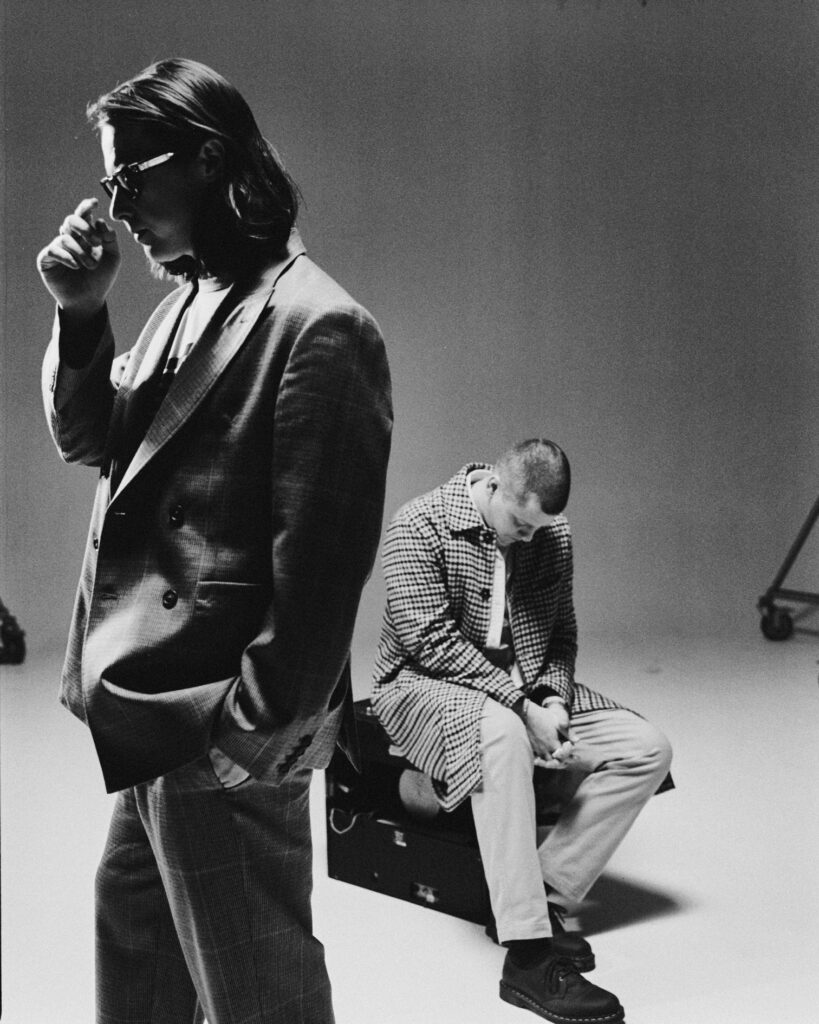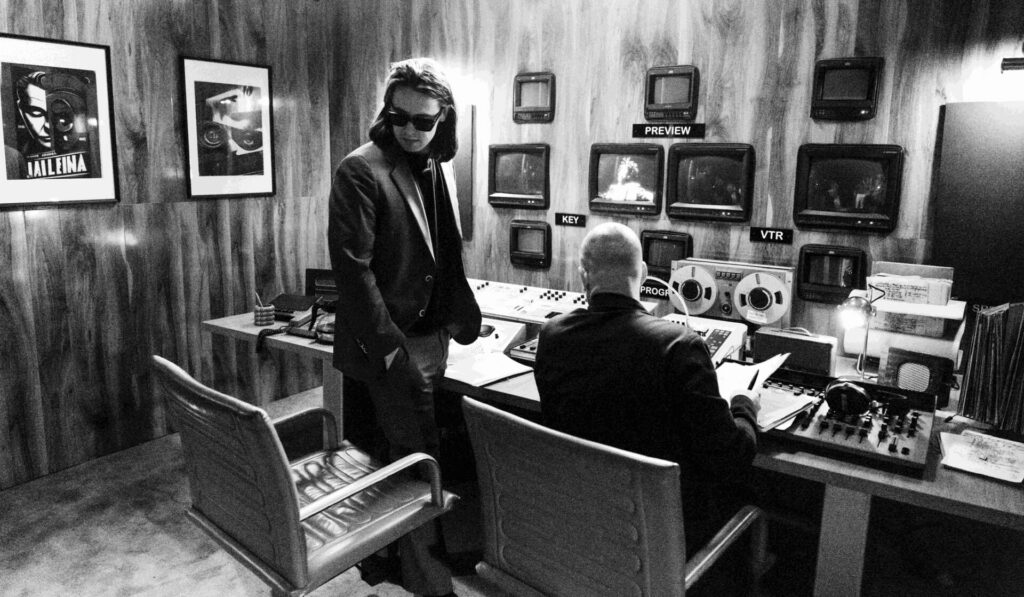Jungle: ‘We can literally do whatever the f**k we want’
After 10 years on the scene, Tom McFarland and Josh Lloyd-Watson, the UK duo behind dance act Jungle, are displaying a new-found confidence. As they release Volcano — their second record from their own label — it’s clear that they are feeling free to experiment with collaborators and their creativity is pouring forth

Inside a studio in an industrial park in west London, UK dance act Jungle are prepping for their headline show at London festival All Points East at the end of August — and the level of care being taken over it is a strong indication of their attitude towards making music.
While pacing the car park outside, Tom McFarland, who created Jungle in 2013 alongside childhood friend, fellow producer, vocalist and instrumentalist Josh Lloyd-Watson, is running through the creative journey behind their imminent fourth studio album, Volcano. It soon becomes clear that detail is important for the duo.
“We set ourselves big challenges, in the studio, on stage, during the visual process of realising everything, and I think it really pays dividends. If we were just like ‘Go into a studio, make a song, let someone else make the video, turn up and play it live and then go home again,’ that’s just not the all-encompassing experience we want from being in the music industry.”
This exhaustive approach has been the driving force behind Jungle’s global success. Scan the comments below any of their videos on YouTube and you’ll be struck by the passion and emotional attachment fans in every corner of the world feel towards the pair. The feverish sense of hype and intrigue that surrounded their early releases (when the fresh, powerful sound of tracks like 2013’s ‘Busy Earnin’ and ‘Time’ was only intensified by the fact that the pair loosely obscured their own identities) has been gradually replaced by a firmer bond. And that’s a reflection of how hard McFarland and Lloyd-Watson work on every inch of their art.
As they’ve become more confident, Jungle have connected with people on a deeper level. 2021’s ‘Keep Moving’ provided fans with an upbeat post-pandemic antidote, while last year’s follow-up double-single ‘Good Times/Problemz’ strengthened the striking cinematic world that the duo have been developing.

Visuals are central to the journey; from the release of ‘Busy Earnin’ to the unveiling of two brand-new narrative-driven pieces (‘Dominoes’ and ‘Candle Flame’) in the run-up to Volcano, their music videos have consistently been structured around explosive, intricately choreographed dance performances. As McFarland and Lloyd-Watson have taken Jungle from an exciting bedroom-pop outlet to one of the most respected global dance music acts of the past decade, this visual element of their music has remained central throughout.
“I think it’s just about building that world for us,” says McFarland. “It’s a visual world, it’s a sonic world, and the live show is a massive part of that, too. It feels to me like we’ve created this kind of weird, modern electronic, funk-soul-disco, dance opera… it makes us quite emotional seeing the songs realised in such an amazing way by these amazing dancers.
“Working with people is fun, it’s exciting,” he continues. “It gives us a much deeper perspective on what we’re doing because you can get lost in your own head and wrapped up in your own emotions, and I think actually when someone comes in and sheds a bit of light on a different corner of the room, it gives you energy to paint the rest of it.”
That applies to the dance element of the project, but it also reflects probably the most notable recent shift in Jungle’s musical output: a much heavier emphasis on collaboration. “It’s something we were probably a little bit scared of doing early doors,” explains McFarland. “We didn’t necessarily have the confidence in who we were or what we were doing. Collaborating with other people, especially with music, is the only way you’re gonna learn, the only way you’re gonna progress. We dipped our toe into the features water on the third record, but now I think we’ve got something a little bit more meaningful.”
The plethora of artists heard on Volcano is impressive. There’s a verse from Brooklyn MC Erick The Architect on ‘Candle Flame’ that “takes the song to a whole new level”; a bucket list-ticking feature from legendary UK rapper Roots Manuva on the rocking, ragga-tinged ‘You Ain’t No Celebrity’, and a reappearance from US rapper and prior collaborator Bas on ‘Pretty Little Thing’, a poignant album closer structured around soft acoustic guitar and pitched-up, slightly pained soprano vocal clippings. On top of that, there are regular contributions from close friend and collaborator Lydia Kitto, whose stunning vocals are heard across the project.
“I don’t think we’ve ever really seen ourselves as storytellers in our lyrics, but working with artists who are storytellers and whose modus operandi is to tell a story every time they turn the mic on, it’s definitely giving us a bit of incentive to go and do that a little bit more ourselves,” says McFarland. For now, though, they’re happier than ever to take a back seat and let their collaborators shine.
“This album is definitely trying to take the pressure off us as the main performers. Essentially, we’re directors and producers, not necessarily artists, and being able to provide a platform for other people to give us their artistry and show the world their artistry as well has been really special for us. It’s like that age-old thing of hating the sound of your own voice when you’re recorded talking, and actually, when someone else is doing that for you, it’s really exciting and it feels really fresh.”
Volcano signals another departure in that it featuresjust one sample — the guitar lick from Gloria Taylor’s ‘How Can You Say It’, on new single ‘Dominoes’. Warm and fuzzy, yet distant, the song’s vocal hook exudes a kind of soulfulness you rarely hear outside the Motown records of the 60s and 70s. The rest of the album is equally bursting with the grainy, melodic magic of old-school disco and soul, and the energy of the 80s Chicago house scene it gave way to. That’s no accident — having created a “space where we can go and do anything”, Jungle are constantly striving to expand their creative process, and on Volcano, giving new recordings a heavy splash of retro colour was a central part of that.
“It’s a process we’ve been trying to perfect over the years,” says McFarland. “The idea of sampling, the aesthetic that it gives you, has always been massively important to us. The process is almost endless, and you can go down so many avenues… for us, it’s that ultimate challenge of ‘How about we don’t sample? How about we create this vision that is completely ours from top to bottom?’”
However, McFarland and Lloyd-Watson didn’t always have the creative control to be able to make these kinds of decisions. But since establishing their own label, Caiola Records — on which they released 2021 album Loving in Stereo, as well as Volcano — they’ve enjoyed a new sense of artistic freedom.
“We can literally do whatever the fuck we want, which is pretty rare in the music industry,” says McFarland, half-laughing. “No one’s sitting there going ‘You haven’t got enough TikTok followers’ or ‘You’re not posting enough on Instagram.’ The last two records have felt so good to us because we’re not being asked to make singles or make more songs or do this or do that.
It’s just given us carte blanche.
“If we find an artist that we love, let’s make a track with them. But we don’t wanna become the thing that we’re trying to get away from. I would never want to try and have another artist’s destiny in our own hands, because we’ve been there before, and we’ve seen how it can be damaging. So, we’re definitely going to stay clear of becoming the man.”

When working with the likes of Lydia Kitto, Roots Manuva and JNR Williams on Volcano, spontaneity was essential. For McFarland, there are no regrets over Jungle’s past, but he concedes that they did get “bogged down” by aims and expectations when creating second album For Ever, released in 2018. Alongside the broader sonic vision, their new album is shaped by a refusal to overthink things.
“It’s just about speed, speed of idea, speed of execution,” says McFarland. “Loving in Stereo was the first step towards actually becoming much more creatively free — almost being as creatively free as we were on the first record. On Volcano, we’ve taken that and maximised it. There’s so much energy on this record, it feels a little bit more ‘DJ-ed’, for want of a better word. We wanted it to feel modern and exciting and we wanted it to fucking slap on the speakers, and that’s something we’ve really achieved. Trying to negate and trying to remove over-analysis and overthought from what we do has been a really key part of that.”
McFarland’s examination of the record’s electronic emphasis is spot on — while there are some mellow moments in Volcano, it’s packed with tracks that would pop off in a nightclub. ‘Holding On’ is built around a pumping house beat, with searing, distorted vocals from vocalist Andreya Triana. ‘Us Against the World’ is such a strident, super-funky call-to-arms — described by McFarland as probably “the first time we’ve explored how we feel about the world, about society” — that it’s impossible not to bop your head to it. Largely written on the Loving in Stereo tour, with early demos recorded on makeshift production stations backstage, it’s an album that untethers the confident, dance-centric energy of their third album, and takes things to the next level.
Those new tracks are a long way from the soft, brooding synths and harmonised hums of early efforts like ‘Crumbler’ and ‘Drops’, but this new side of the production duo has been there for a while now. Primarily, the dancefloor vibes reflect the fact that right now, the main purpose of Jungle is simple: having fun. And in live settings, that intention is paying off.
“I think the visceral response that we have now is much stronger,” says McFarland. “In the early days, there was a certain amount of people waiting to be entertained. It was like ‘You’ve done this on the record, can you do it live?’, or ‘Who the fuck are you?’ So, actually, the reaction was mostly surprise, or shock, like, ‘This is better than I thought it was gonna be!’ Now that we’ve been doing this for 10 years, and people have attached themselves to the music and the group, there’s a much more visceral reaction live, and we’ve gotta play to that — we’ve gotta amp it up.”
How do they do that? “For us now, it’s about delivering things that people know in a different way. We can’t just go out and play ‘Busy Earnin’ the way that we’ve played it for 10 years — it’s gotta be changed and I think that’s a really exciting challenge for us: how can we uplift some of those old songs and old emotions into the new sonic space that we’re heading towards? Simple things like changing the tempo, trying to match tempos to create a continuous stream of music. We’re not just a band that stands on stage and plays some funk songs. Josh and I are producers, we’re directors, and I think what people are gonna see from the live show is something much more along those lines, but also with the added intensity and dynamic of real people playing instruments.”
The duo’s move towards a more fluid live experience stems from the fact that they’ve been DJing much more regularly over the past couple of years. Their increased focus on this side of their artistry is also a driving factor behind Volcano being their most electronic-sounding album to date. But as McFarland notes, it wouldn’t really be Jungle if this sonic shift didn’t also come with its own challenges.
For now, the key task on the horizon is getting ready for All Points East. Its significance isn’t lost on McFarland and Lloyd-Watson, as they plan the concert in intricate detail. It’ll offer them the chance to test ideas and gear up for an autumn tour that’ll take them across Europe and North America. Crucially, the date will also be a homecoming gig.
“Playing in London is so special. Being from London, it’s a marquee moment. It’s always nerve-wracking, but it’s always exciting, it makes you want to make it super special. It’s go hard or go home for us.”
